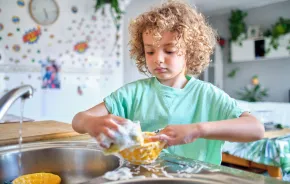
As a pediatrician with Bellevue’s Allegro Pediatrics, Dr. Tiffany Spanier supports whole-child health. That means her typical workday is a whirlwind of well-child checkups mixed in with everything from coughs to concussions. It’s as rewarding as it is demanding, she says.
“I see a spectrum of ages, from newborns to adolescents, so there’s a lot of variety,” Spanier says. “I also help caregivers address specific behavioral, academic and emotional needs. It’s a full day.”
Though she’s usually immersed in the health needs of kids, Spanier knows a thing or two about the challenges of raising them — she’s a parent, too. Since she first joined Allegro Pediatrics in 2004, she says, the demands of parenthood have changed. These days, parents are squeezed and stressed, and it’s hurting families, she says.
“Parenting has become increasingly demanding and difficult,” Spanier says. “Without enough help and support, parents risk their own emotional and physical well-being, which negatively impacts everyone, including their children.”
Whether she’s in the examination room or writing for Allegro’s health and parenting blog, Spanier works to help parents understand the importance of emotional wellness and its strong connection to physical health. (She became a certified mindfulness instructor in 2016.)
“I like to help parents find joy in the relationship, and for parents and kids to feel loving and connected. Those are the foundations for physical, mental and emotional well-being.”
Has raising your own children changed the way you approach your patients?
As a pediatrician, having your own children is a humbling experience. You quickly realize there’s a big difference between giving advice and following it. Since having children, I hope I’ve become more patient and understanding.
What’s the top question or anxiety you hear about from your patients or their caregivers?
The questions that I hear are so varied … but the underlying concept that appears the most consistently is “Am I doing a good job as a parent?” and “Is my child going to be okay?” I’m always looking for ways to support and reassure families that they are doing a good job and that their child is going to be okay.
How can caregivers raise children who are strong and healthy — both emotionally and physically?
As pediatricians, we recognize that there is a strong connection between children’s emotional, physical and mental well-being. If a child has a challenge in one of these areas, it can directly impact the other two. Each well-child appointment is a great opportunity for parents to get guidance and support from their pediatrician about how to meet the needs of their children.
What role does empathy and kindness play in raising healthy kids?
Empathy allows us to see what it is like to be in someone else’s shoes, to try to understand and care about what others are thinking and feeling. It’s a life skill that supports children in developing successful friendships. When we model and teach kids about empathy, it fosters connections of tolerance, respect and kindness. And research shows that kindness can lead to increases in happiness and well-being. So, empathy and kindness are not only ways to build supportive connections, but they are also great ways to help our kids feel strong, happy and healthy.











